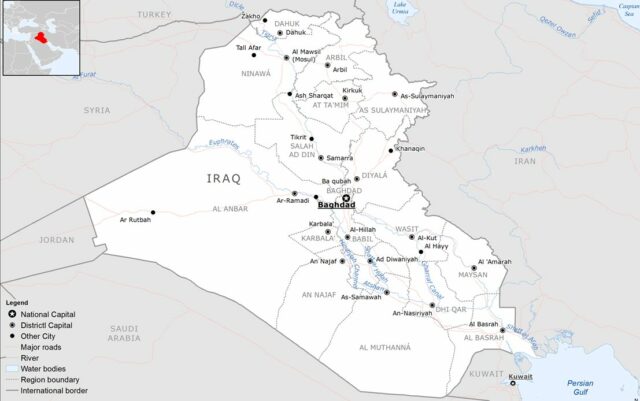
Geopolitical Report ISSN 2785-2598 Volume 39 Issue 7
SpecialEurasia OSINT Team
Iraq, a country rich in oil and gas resources, faces a complex landscape that regional and international key players have affected and exploited for their strategic goals. While Iraqi oil-dependent economy and political instability pose challenges, ongoing infrastructure investments, diplomatic shifts, and geopolitical balancing act present opportunities. Security threats, economic uncertainties, and infrastructure deficiencies contribute to potential risks. This SWOT Analysis based on Public Available Information (PAI) aims to investigating Iraq’s current situation and informing strategic decisions.
Formerly under Ottoman rule, Iraq gained independence in 1932. A turbulent history, including the Gulf War in 1991 and the 2003 invasion, shaped its political landscape. After the fall of Saddam Hussein’s regime, Iraq has grappled with challenges such as terrorism, political instability, and geopolitical tensions. Recent years have seen efforts to stabilise the political scene, even though till today the country still has a medium-high risk level.
Strengths
- Abundant Oil and Gas Reserves: Iraq boasts vast and cost-effective oil and gas reserves, forming the backbone of its economy.
- Foreign Investment: Growing interest from foreign investors in infrastructure sectors enhances economic development.
- Improved Relations with China: Agreements with China in oil and construction sectors foster economic cooperation.
- Young Population: A youthful demographic presents opportunities for a dynamic workforce and economic growth.
Weaknesses
- Oil Dependency: Heavy reliance on oil leaves the economy vulnerable to price fluctuations and a large gas deficit.
- Budgetary Management: Lack of rules for managing oil and gas revenues risks inefficiencies and mismanagement.
- Infrastructure Challenges: Weak electricity and water supplies, coupled with a fragile banking system, hinder economic progress.
- Social and Political Instability: Factors like Iranian interference and ethnic divisions contribute to political instability, affecting governance.
Opportunities
- Infrastructure Investments: Approved budgets for 2023-2025 enable significant infrastructure projects, boosting non-oil GDP growth.
- Diplomatic Rebalancing: Iraq can capitalise on diplomatic shifts, maintaining equidistance between major allies and enhancing international relations.
- Geopolitical Shifts: Improved relations between Saudi Arabia and Iran present opportunities for stability and economic cooperation.
- Relations with China: Strengthening ties with China offers commercial and diplomatic opportunities for Iraq.
Threats
- Security Challenges: Armed conflict, terrorism, civil unrest, and regional geopolitical tensions pose significant security threats.
- Ongoing Terrorism: Persistent threats from groups like the Islamic State and al-Qaeda impact safety and security, affecting citizens and institutions.
- Crime and Kidnappings: High crime rates, including armed robbery and kidnappings, pose risks to both locals and foreign workers.
- Political Uncertainty: Despite relative stability, political tensions and violence may escalate, affecting governance and public safety.
- Infrastructure Deficiencies: Poorly maintained infrastructure poses a threat to economic development and public well-being.
Read more | Increasing Geopolitical Risk in the Middle East |
Risk Assessment
- Economic Risks. Iraq faces economic risks stemming from twin deficits, heavy reliance on oil, and budgetary challenges. The overall economic stability could be at risk because of a projected current account deficit in 2024, resulting from the decline in oil prices and the increase in private consumption. The vulnerability to oil price fluctuations poses challenges to fiscal sustainability. The increased budget deficit, resulting from expansive public spending and decreased government revenue from oil, gives rise to additional economic uncertainties. Mitigating these risks requires diversification efforts, prudent fiscal policies, and a focus on non-oil sectors to ensure a more resilient and balanced economy.
- Security Risks. Security challenges, including armed conflict, terrorism, and geopolitical tensions, present significant risks to Iraq’s stability. The aftermath of the U.S. airstrike and subsequent retaliation from Iran, along with persistent threats from groups like the Islamic State and al-Qaeda, heighten the security landscape. The ongoing and repeated targeting of U.S. military and diplomatic interests by Iran-backed Shiite groups contributes to the increased complexity of the situation. The ongoing conflict in the region, especially the Israel-Hamas situation, contributes to heightened geopolitical tensions. Addressing security risks requires robust counter-terrorism measures, diplomatic efforts to reduce tensions, and a comprehensive approach to ensure the safety of citizens and institutions.
- Political Risks. Despite relative stability, political risks persist, stemming from political instability, tensions between regions, and potential violence. The delay in forming a government after the 2021 elections and ongoing challenges in the political landscape highlight the fragility of the political environment. The electoral law passed in 2023, while intended to address previous political paralysis, may inadvertently contribute to increased tensions and violence. Efforts to integrate various political factions, particularly Shiite, Sunni, and Kurdish, need to be carefully managed to avoid exacerbating existing divisions. Strengthening political institutions, promoting inclusive governance, and addressing social discontent are essential to mitigate political risks.
- Infrastructure Risks. Deficiencies in Iraq’s infrastructure, especially in the electricity and water sectors, pose risks to overall development and public well-being. The poorly maintained and underdeveloped infrastructure may hinder economic growth, affecting the quality of life for citizens. Power outages, inadequate water supplies, and a lack of essential services contribute to challenges in daily living. To address these risks, targeted investments in infrastructure projects, efficient maintenance, and sustainable development practices are crucial. Building resilient and modern infrastructure will not only improve the living conditions of the population but also contribute to economic growth and stability.
Conclusion
In contemporary Iraq, while oil remains a cornerstone, diversification efforts and infrastructure investments provide avenues for growth. Mitigating security threats, addressing political tensions, and focusing on sustainable development will be crucial for Iraq to harness its strengths and navigate the complex geopolitical environment.
Read more | Iraq: the Islamic State continues threatening regional security |
For those with an interest in acquiring comprehensive insights into the geopolitical dynamics Iraq and the Middle East, we encourage you to reach out to SpecialEurasia by emailing info@specialeurasia.com. We are ready to assist you in evaluating the possibility of acquiring a carefully crafted and customised report to meet your intelligence requirements.



